Region: Multiregional
October 1999, Volume 10, Issue 4
Debating Democracy Assistance: Toward a New Paradigm
Read the full essay here.
October 1999, Volume 10, Issue 4
Debating Democracy Assistance: A Tune-Up, Not an Overhaul
Read the full essay here.
October 1999, Volume 10, Issue 4
Debating Democracy Assistance: The Cost of Doing Nothing
Read the full essay here.
October 1999, Volume 10, Issue 4
Debating Democracy Assistance: Sometimes Less Is More
Read the full essay here.
October 1999, Volume 10, Issue 4
Exploring Globalization
Review of The Lexus and the Olive Tree, by Thomas L. Friedman.

July 1999, Volume 10, Issue 3
Democracy as a Universal Value
The recognition of democracy as a universally relevant system is a major revolution in thinking, and one of the main contributions of the twentieth century. While not yet universally practiced, democracy is now being taken as generally right.
January 1999, Volume 10, Issue 1
The Post-Cold War World: Globalization and the International System
Read the full essay here.
October 1998, Volume 9, Issue 4
Promoting Democracy, Peace, and Solidarity
Read the full essay here.
April 1998, Volume 9, Issue 2
Guaranteeing Democracy: A Review of the Record
Read the full essay here.
October 1995, Volume 6, Issue 4
Armed Forces and Democracy: Reforming Civil-Military Relations
Read the full essay here.
April 1995, Volume 6, Issue 2
Economic Reform and Democracy: The Politics of Safety Nets
Read the full essay here.
April 1995, Volume 6, Issue 2
Parliaments Over Presidents
A review of The Failure of Presidential Democracy, edited by Juan J. Linz and Arturo Valenzuela.
January 1995, Volume 6, Issue 1
Democracy’s Future
The Editors’ introduction to “Democracy’s Future.”
January 1995, Volume 6, Issue 1
Democracy’s Future: The Primacy of Culture
Democratic consolidation in the East will face the most difficulties in the cultural sphere. Democracy’s fate will depend on how the West handles its own sociocultural problems.
April 1994, Volume 5, Issue 2
The Key Role of the Working Class
A review of Capitalist Development and Democracy, by Dietrich Rueschemeyer, Evelyne Huber Stephens, and John D. Stephens.
October 1993, Volume 4, Issue 4
The Challenge of Ethnic Conflict
The Editors’ introduction to “The Challenge of Ethnic Conflict.”
July 1993, Volume 4, Issue 3
International Organizations & Democracy: The United Nations and the New World Order
Read the full essay here.
July 1993, Volume 4, Issue 3
The Measure of Freedom
A review of Freedom House’s Freedom in the World: The Annual Survey of Political Rights and Civil Liberties, 1992-1993.
January 1992, Volume 3, Issue 1
The Surging Tide of Democracy
A review of The Third Wave: Democratization in the Late Twentieth Century, by Samuel P. Huntington
Summer 1991, Volume 2, Issue 3
The Unfinished Revolution
Read the full essay here. The Editors’ introduction to “The Unfinished Revolution.”
Winter 1990, Volume 1, Issue 1
Why the “Journal of Democracy”
The Journal of Democracy seeks to bridge some of these gaps. We hope that it will help to unify what is becoming a worldwide democratic movement. But like genuine democracy itself, the journal will be pluralistic. Its pages will be open to a wide variety of perspectives and shades of opinion, and it will seek…

How to Dictator-Proof Your Money
Cash is king, even if you are an activist leading a democratic movement against some of the world’s worst dictators. That’s why Bitcoin has quickly become the currency of choice for dissidents working everywhere.

Global Freedom Is in Decline, But What About Democracy?
Democracy is more resilient than many people realize, but that doesn’t mean there aren’t worrying signs on the horizon.
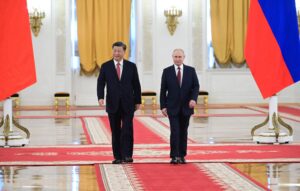
The World Has Become Flatter for Authoritarian Regimes
They are benefiting from a world that has grown more hostile for democracy and human rights. But it doesn’t need to be the case. Democracies need to double down on their own competitive advantage.
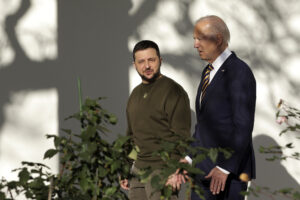
Stop Trying to “Defeat” Russia and China
Moscow and China pose a great danger to the democratic world. But they pose threats that need to be managed, not won. Every great foreign-policy battle doesn’t end with a decisive victory.

Why Ukraine Is Critical to Rebuilding Our Democratic Consensus
The case for liberal democracy remains powerful. It may get its biggest boost in the near term from success on the battlefields of Ukraine.
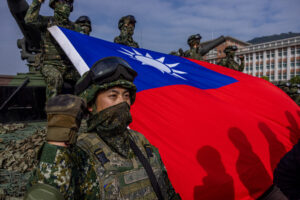
What It Takes to Win the New Cold War with China
Our struggle against the Soviet Union offers vital lessons for how to confront the aggressive totalitarian threat that Beijing now represents.

What the Freedom Agenda Can Still Teach Us
Many derided it as naïve idealism, but the vision undergirding the Freedom Agenda offers lessons for the biggest global tests of our time.

How the World Stands Up to Putin
His military didn’t just fail. Ordinary Ukrainians, Russians, and people across the globe are creatively and nonviolently protesting Putin’s war on Ukraine, and they are making a difference.

Breaking Han Silence
China’s recent protests marked a crucial milestone: The mainstream Chinese public, at home and abroad, finally spoke up for the Uyghurs and their plight.

How Qatar Became a World Leader in Sportswashing
The government has spent billions preparing to host the 2022 World Cup. Never mind the abusive labor practices and human rights violations. It’s betting that your love of the “beautiful game” will make you more fond of this tiny Gulf state, too.

Democracy’s Frontline Defenders
Across the globe, the people who run our elections are being undermined, targeted, and attacked. Here is how to shore them up—and protect democratic institutions, too.
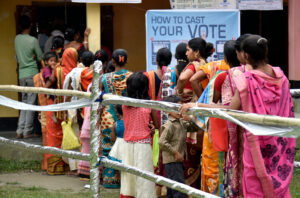
Why Don’t Voters Care About Local Government?
National politics is increasingly overshadowing everything else, even as local government does more and more. Here’s how to right the balance.

The Life of the Party
Establishment parties are flagging. They should learn from political disruptors.
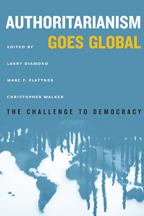
Authoritarianism Goes Global: The Challenge to Democracy
In recent years, as leading authoritarian countries such as China, Iran, Russia, Saudi Arabia, and Venezuela have become emboldened within the global arena, challenging the liberal international political order, the advanced democracies have retreated rather than responding to this threat.
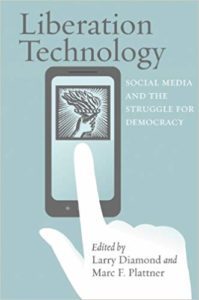
Liberation Technology
"Liberation technology" can help mobilize citizen protest and oust autocracies. Authoritarians can also use technology to stifle protest and target dissenters. Who will win the technological race between "netizens" demanding freedom and authoritarians determined to stay in power?
